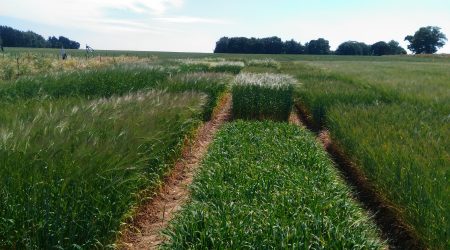Essential investment in plant and microbial research in Norwich confirmed

Development of our exciting, ground-breaking plant and microbial science and innovation hub can go ahead with confirmation of funding announced today.
The transformational investment will fund new cutting-edge, world-class facilities for the John Innes Centre (JIC) and The Sainsbury Laboratory (TSL) at the heart of the Norwich Research Park. This will deliver a step change in our capability to translate scientific knowledge into bio-based solutions in response to some of society’s most pressing challenges.
As well as transforming the existing capabilities of the John Innes Centre and The Sainsbury Laboratory, both internationally recognised centres of excellence in plant and microbial science, the new hub also aims to become a net-zero carbon laboratory.
The JIC and TSL Next Generation Infrastructure programme is funded by the UKRI Infrastructure Fund, which invests in the facilities, equipment and resources that are essential for researchers and innovators to do ground-breaking work.
The programme will develop the site over the next seven years, with £54.7 million being invested over the first three years, and a total investment of £317.7 million from the Fund.
Professor Melanie Welham, Executive Chair of the Biotechnology and Biological Sciences Research Council (BBSRC), part of UK Research and Innovation (UKRI), said: “Providing access to cutting-edge, sustainable research and innovation infrastructures is mission-critical to the competitiveness and long-term success of UK bioscience.
“UKRI’s investment in the John Innes Centre and The Sainsbury Laboratory Next Generation Infrastructure provides an important opportunity to further improve our local connections with key partners at Norwich Research Park, the likes of which include Earlham Institute and Quadram Institute.
“Beyond that, the investment also represents a real opportunity to establish a world-leading global interdisciplinary hub for plant and microbial sciences that will help deliver the bio-based solutions needed to address global challenges around sustainable agriculture, food, nutrition and health.”
With construction of the new hub expected to be completed in 2030, an ongoing fundraising campaign is underway to secure a further £30 million investment to support the full cost of the Next Generation Infrastructure programme.
Professor Graham Moore, Director of the John Innes Centre, said: “Securing this funding is a major step forward in realising our vision to improve collaborative working across the UK and overseas, helping us to provide a safer, healthier and more sustainable future through the power of plant and microbial science. As well as new laboratories, the investment includes a redevelopment of our plant growth facilities, which in conjunction with our existing field station, will improve our ability to study the effects of climate change.”
Professor Nick Talbot FRS, Executive Director of The Sainsbury Laboratory, said: “This transformational investment exemplifies the UK’s confidence in the future of our research institutes and their ability to transform global agriculture through innovation. It is imperative that agricultural production is transformed to become a net carbon zero activity that no longer relies on fossil fuels. The investment from UKRI will enable us to harness the collaborative environment on the Norwich Research Park, catalysing new research initiatives and creating a unique asset for UK science and innovation.”
Enabling an ambitious vision
The investments from the UKRI Infrastructure Fund and other key partners will enable the realisation of an ambitious longer-term vision. Healthy Plants, Healthy People, Healthy Planet (HP3) seeks to provide a safer, healthier and more sustainable future through the power of plant and microbial science.
This bold vision represents a revolution in plant and microbial sciences that strives to integrate advances in genetics, genomics, structural biology, live cell imaging and computational biology to reach new levels of understanding.
HP3, and the development of a global interdisciplinary hub for plant and microbial research has garnered generous contributions from the Gatsby Charitable Foundation, the University of East Anglia, the John Innes Foundation, the Wolfson Foundation and the Garfield Weston Foundation.
The new hub will play a pivotal role in reducing the impact of climate change, providing long term sustainable food solutions, improving human health and enhancing growth and economic prosperity across the UK and beyond.
Contacts
- Felicity Perry, Head of Communications, John Innes Centre
- T: 01603 450269 M: +44 (0)7881255193
- E: felicity.perry@jic.ac.uk
About the UKRI Infrastructure Fund programme
The UKRI Infrastructure Fund supports the facilities, equipment and resources that are essential for researchers and innovators to do ground-breaking work.
This strategic fund helps to create a long-term pipeline of research and innovation infrastructure investment priorities for the next 10 to 20 years. It supports a range of projects from new infrastructures to major upgrades, delivering a step change in infrastructure capability and capacity.
The Infrastructure Fund spans the complete disciplinary spectrum and funds infrastructures located across all of the UK’s regions and nations, and those which form part of major international collaborations.
UKRI Infrastructure Fund projects
About Healthy Plants, Healthy People, Healthy Planet (HP3)
Healthy Plants, Healthy People, Healthy Planet (www.hp3.org) is a collaborative vision and call to action, initiated by The Sainsbury Laboratory and the John Innes Centre. HP3 aims to galvanise the research and innovation community to meet the era-defining challenges of feeding the world, combating global health threats and climate changes.
The Infrastructure Fund investment (a total of £317.7 million) supports the creation of a hub for plant and microbial science, designed to amplify the Norwich Research Park’s knowledge, expertise and skills. Plants and microbes will play an important role in a second “green revolution”, and this investment will ensure that the UK is at the fore, supercharging our ability to turn knowledge into solutions.
HP3 will bring knowledge, skills and people together to create ideas and innovations that allow us to sustainably feed a growing population, mitigate the effects of climate change and use our understanding of plants and microbes to develop foods and discover compounds to improve public health.
Aiming to be a net-zero carbon laboratory, providing a new home to the John Innes Centre and The Sainsbury Laboratory, and becoming a hub where interdisciplinary partners and collaborators can work side-by-side with researchers.
About the Next Generation Infrastructure / HP3 Programme Team
The JIC/TSL Next Generation Infrastructure team is supported by consultants across a range of disciplines, including architects, cost managers and project managers.
Since 2018, AECOM have played a key role in the programme as cost consultants and will continue to support the programme through the development of new infrastructure, lab buildings and technology platforms which aim to be amongst the first zero-carbon laboratory for embodied and operational carbon under UKGBC (UK Green Building Council) Network.
BDP has been involved since the germination of the project to develop a new infrastructure vision for the organisation, which supports the business case. It has helped to define and review options for the buildings that demonstrates collaborative working, scientific impact and innovation, public engagement, education, training, and efficiency.
BDP’s design and engineering team is bringing increased focus on reducing embodied and operational carbon emissions, creating environments needed for ground-breaking scientific endeavour while also meeting the technical requirements the research teams.
Turner & Townsend is the Delivery Partner for the programme, drawing on its sustainability, net zero consulting and technical programmatic delivery capability, they are providing programme, project management and digital consultancy services for this complex, multi-phased, re-development project. Turner & Townsend has supported the project since 2018 and is excited to continue its journey to create and deliver the next generation of net-zero laboratory facilities for the John Innes Centre and The Sainsbury Laboratory.



